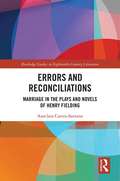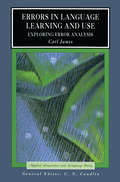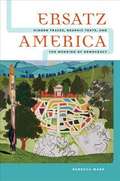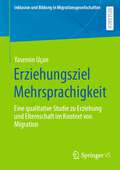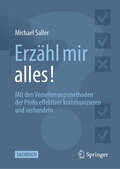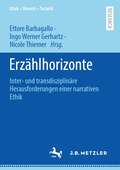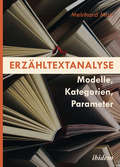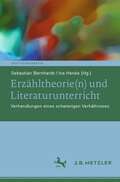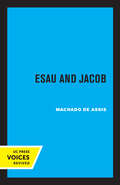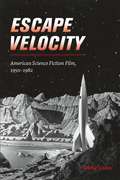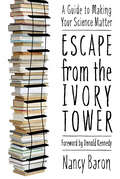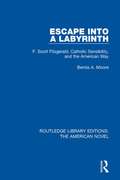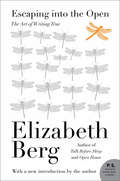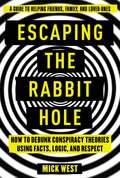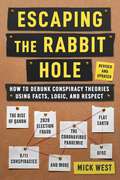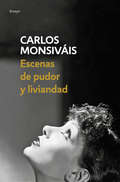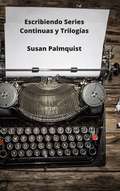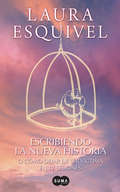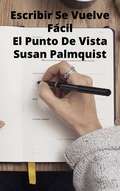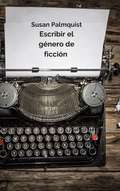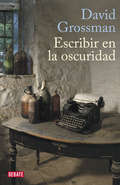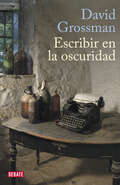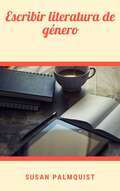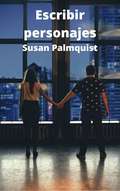- Table View
- List View
Errors and Reconciliations: Marriage in the Plays and Novels of Henry Fielding (Routledge Studies in Eighteenth-Century Literature)
by Anaclara Castro-SantanaHenry Fielding is most well-known for his monumental novel Tom Jones. Though not necessarily common knowledge, Henry Fielding started his literary career as a dramatist and eventually transitioned to writing novels. Though vastly different in their approach and subject, there is a common thread in Fielding’s work that spanned his career: marriage. Errors and Reconciliations: Marriage in the Plays and Novels of Henry Fielding explores this theme, focusing on Fielding’s fascination with matrimony and the ever-present paradoxical nature of marriage in the first half of the eighteenth-century, as a state easily attained but nearly impossible to escape.
Errors in Language Learning and Use: Exploring Error Analysis (Applied Linguistics and Language Study)
by Carl JamesErrors in Language Learning and Use is an up-to-date introduction and guide to the study of errors in language, and is also a critical survey of previous work. Error Analysis occupies a central position within Applied Linguistics, and seeks to clarify questions such as `Does correctness matter?', `Is it more important to speak fluently and write imaginatively or to communicate one's message?' Carl James provides a scholarly and well-illustrated theoretical and historical background to the field of Error Analysis. The reader is led from definitions of error and related concepts, to categorization of types of linguistic deviance, discussion of error gravities, the utility of teacher correction and towards writing learner profiles. Throughout, the text is guided by considerable practical experience in language education in a range of classroom contexts worldwide.
Ersatz America
by Rebecca MarkFrom the popular legend of Pocahontas to the Civil War soap opera Gone with the Wind to countless sculpted heads of George Washington that adorn homes and museums, whole industries have emerged to feed America's addiction to imaginary histories that cover up the often violent acts of building a homogeneous nation. In Ersatz America, Rebecca Mark shows how this four-hundred-year-old obsession with false history has wounded democracy by creating language that is severed from material reality. Without the mediating touchstones of body and nature, creative representations of our history have been allowed to spin into dangerous abstraction.Other scholars have addressed the artificial qualities of the collective American memory, but what distinguishes Ersatz America is that it does more than simply deconstruct--it provides a map for regeneration. Mark contends that throughout American history, citizen artists have responded to the deadly memorialization of the past with artistic expressions and visual artifacts that exist outside the realm of official language, creating a counter narrative. These examples of what she calls visceral graphism are embodied in and connected to the human experience of indigenous peoples, enslaved Africans, and silenced women, giving form to the unspeakable. We must learn, Mark suggests, to read the markings of these works against the iconic national myths. In doing so, we can shift from being mesmerized by the monumentalism of this national mirage to embracing the regeneration and recovery of our human history.
Erziehungsziel Mehrsprachigkeit: Eine qualitative Studie zu Erziehung und Elternschaft im Kontext von Migration (Inklusion und Bildung in Migrationsgesellschaften)
by Yasemin UçanIn der Studie wird die Erziehung zur frühkindlichen Mehrsprachigkeit in Familien aus der Türkei untersucht. Anhand von mehrsprachigen qualitativen Interviews mit Müttern und Vätern, differenziert nach Geschlecht, Migrationsgeneration und Schulbildung, werden Erziehungsvorstellungen, familiäre Aushandlungen sowie Erwartungen an Einrichtungen der Frühpädagogik diesbezüglich herausgearbeitet. Als ein wichtiges Ergebnis ist festzuhalten, dass die elterliche Erziehung zur Mehrsprachigkeit in komplexe Planungs- und Reflexionsprozesse eingebettet ist und sich durch ein hohes Maß an (unsichtbarer) Erziehungsarbeit auszeichnet. Gleichzeitig sind vielfache Spannungen festzuhalten, die sich aus normativ gerahmten Erziehungsvorstellungen sowie der konkreten migrations- und minderheitenspezifischen Lebenslage und familiären Dynamiken ergeben.
Erzähl mir alles!: Mit den Vernehmungsmethoden der Profis effektiver kommunizieren und verhandeln
by Michael SallerDieses Buch bietet Einblicke in die speziellen Techniken, mit denen Profis bei Vernehmungen und Befragungen die gewünschten Informationen erhalten, und erklärt, wie sie für die tägliche Kommunikation genutzt werden können. Der erste Teil erläutert die Unterschiede zwischen Vernehmung und Befragung, stellt Methoden zur Bewertung von Aussagen vor und diskutiert zwei prominente Fälle aus dem Strafrecht (Kachelmann, Mollath). Der zweite Teil konzentriert sich auf bewusste Lügen von Befragten und beschreibt, wie die Glaubwürdigkeit von Personen und die Glaubhaftigkeit von Aussagen methodisch analysiert werden. Der dritte Teil behandelt den Umgang mit Erinnerungen und Irrtümern bei Zeugenaussagen. Der vierte Teil zeigt ein sechsphasiges Modell der effizienten Informationsgewinnung mit praktischen Beispielen und bietet 30 Expertentipps für informativere Gespräche.
Erzählhorizonte: Inter- und transdisziplinäre Herausforderungen einer narrativen Ethik (Ethik – Mensch –Technik)
by Ettore Barbagallo Ingo Werner Gerhartz Nicole ThiemerNarrative sind immer schon Grundbestand der menschlichen, kulturellen, sozialen und gesellschaftlichen Verständigungshorizonte. Der Band Erzählhorizonte widmet sich der Auseinandersetzung mit möglichen Formen einer narrativen Ethik, indem aus inter- und transdisziplinärer Sicht dem menschlichen und lebensweltlichen Grundphänomen der Narrativität nachgespürt wird. In Diskursen, die Digitalisierung, Technik, Medizin, Politik, Medientheorie, Anthropologie, Geistesgeschichte, Literaturwissenschaft und auch Theologie umfassen, wird kritisch sowie innovativ und im Gegenwarts- und Zukunftsbezug Narrativität in ihrer tiefen ethischen Dimension beleuchtet.
Erzähltextanalyse [German-language Edition]: Modelle, Kategorien, Parameter
by Meinhard MairThis comprehensive and systematic text book provides teachers and students alike with a profound, yet concise reference for the analysis of narrative texts. It provides appropriate and differentiated terminological and methodological tools to all the questions that arise when analyzing a narrative text. An advantage of this textbook is that the narrative theory models and concepts are presented in understandable and operational analytical categories and parameters and illustrated by tables and matrices to help make the sophisticated analysis easier to understand and memorize. Exemplary model analyses are provided to present and test the performance of this method.This book is valuable not only to literary scholars but is also suitable to teachers and students.Lehrende und Studierende, die einen Erzähltext analysieren wollen, finden in diesem umfassenden, systematischen, profunden und zugleich übersichtlichen Lehrbuch und Nachschlagewerk ein geeignetes und differenziertes terminologisches und methodisches Instrumentarium, um alle Fragen, die bei der Analyse eines Erzähltextes auftauchen, beantworten zu können. Ein Vorzug des vorliegenden Handbuches besteht darin, dass die erzähltheoretischen Modelle und Konzepte in verständliche und operative analytische Kategorien und Parameter umgesetzt und durch Tabellen, Matrizen und graphische Darstellung veranschaulicht werden, um die anspruchsvollen analytischen Raster besser fass- und memorierbar zu machen. In exemplarischen Musteranalysen wird die Leistungsfähigkeit der vorliegenden Erzähltextanalyse erprobt. Das Buch wendet sich nicht nur an Literaturwissenschaftler, sondern ist auch für Lehrkräfte und Schüler geeignet
Erzähltheorie: Verhandlungen eines schwierigen Verhältnisses (Deutschdidaktik)
by Sebastian Bernhardt Ina HenkeDer Umgang mit erzählenden Texten und Medien spielt im Deutschunterricht eine zentrale Rolle. Dabei sollen Schüler/innen lernen, deren Darstellungsverfahren wahrzunehmen, sie mithilfe eines adäquaten Begriffsinstrumentariums zu beschreiben und ihre ästhetische Wirkung zu untersuchen. Die Formulierungen der Vorgaben in den Lehrplänen bieten Raum für weitergehende Fragen nach dem Verhältnis von narratologischen Begrifflichkeiten der Literatur- und Medienwissenschaft einerseits sowie der Theorie und Praxis des unterrichtlichen Umgangs mit erzählenden Texten und Medien andererseits. Die Beiträge des Bandes gehen der facettenreichen Frage nach, ob und wie narratologische Fachbegriffe den Deutschunterricht bereichern können.
Esau and Jacob
by Machado De AssisThis title is part of UC Press's Voices Revived program, which commemorates University of California Press’s mission to seek out and cultivate the brightest minds and give them voice, reach, and impact. Drawing on a backlist dating to 1893, Voices Revived makes high-quality, peer-reviewed scholarship accessible once again using print-on-demand technology. This title was originally published in 1965.
Escape Velocity: American Science Fiction Film, 1950–1982 (Wesleyan Film Ser.)
by Bradley SchauerToday, movie theaters are packed with audiences of all ages marveling to exciting science fiction blockbusters, many of which are also critically acclaimed. However, when the science fiction film genre first emerged in the 1950s, it was represented largely by exploitation horror films—lurid, culturally disreputable, and appealing to a niche audience of children and sci-fi buffs. How did the genre evolve from B-movie to blockbuster? Escape Velocity charts the historical trajectory of American science fiction cinema, explaining how the genre transitioned from eerie low-budget horror like It Came from Outer Space to art films like Slaughterhouse-Five, and finally to the extraordinary popularity of hits like E.T. Bradley Schauer draws on primary sources such as internal studio documents, promotional materials, and film reviews to explain the process of cultural, aesthetic, and economic legitimation that occurred between the 1950s and 1980s, as pulp science fiction tropes were adapted to suit the tastes of mainstream audiences. Considering the inescapable dominance of today’s effects-driven blockbusters, Escape Velocity not only charts the history of science fiction film, but also gives an account of the origins of contemporary Hollywood.
Escape from the Ivory Tower: A Guide to Making Your Science Matter
by Nancy BaronMost scientists and researchers aren't prepared to talk to the press or to policymakers--or to deal with backlash. Many researchers have the horror stories to prove it. What's clear, according to Nancy Baron, is that scientists, journalists and public policymakers come from different cultures. They follow different sets of rules, pursue different goals, and speak their own language. To effectively reach journalists and public officials, scientists need to learn new skills and rules of engagement. No matter what your specialty, the keys to success are clear thinking, knowing what you want to say, understanding your audience, and using everyday language to get your main points across. In this practical and entertaining guide to communicating science, Baron explains how to engage your audience and explain why a particular finding matters. She explores how to ace your interview, promote a paper, enter the political fray, and use new media to connect with your audience. The book includes advice from journalists, decision makers, new media experts, bloggers and some of the thousands of scientists who have participated in her communication workshops. Many of the researchers she has worked with have gone on to become well-known spokespeople for science-related issues. Baron and her protégées describe the risks and rewards of "speaking up," how to deal with criticism, and the link between communications and leadership. The final chapter, 'Leading the Way' offers guidance to scientists who want to become agents of change and make your science matter. Whether you are an absolute beginner or a seasoned veteran looking to hone your skills, Escape From the Ivory Tower can help make your science understood, appreciated and perhaps acted upon.
Escape into a Labyrinth: F. Scott Fitzgerald, Catholic Sensibility, and the American Way (Routledge Library Editions: The American Novel #12)
by Benita A. MooreThis title, originally published in 1988, examines F. Scott Fitzgerald’s Catholic roots and his repudiation of those roots in pursuit of the American dream. The study aims to suggest that an investigation of Fitzgerald’s basic cultural and religious milieu might illuminate what he wrote, and may also illuminate the situation of Catholicism in America at the time. This title will be of interest to students of both literature and religious studies.
Escaping Into the Open: The Art of Writing True
by Elizabeth BergWriting advice from a New York Times–bestselling author who &“knows how the publishing industry works . . . and why writers need to answer only to themselves&” (C. Michael Curtis, senior editor, Atlantic Monthly). Both autobiography and primer, Escaping into the Open is an inspiring, practical handbook on the joys and challenges of the writing life. Renowned author and writing instructor Elizabeth Berg interweaves the story of her own journey from working mother to bestselling novelist with encouraging advice on how to create stories that spring from the heart. Continually in print since its original 1999 publication, this invaluable resource is a true and constant friend to all writers, no matter their stage of development. With wit and honesty, Berg provides numerous exercises that will unleash individual creativity and utilize all five senses. Most important, she tells how to fire passion—emotion—into writing itself; to break through personal barriers and reach one's own outer limits and beyond. &“Crystal clear, bracing as icewater, Escaping into the Open should be read by all scribblers regardless of material success.&” —Rita Mae Brown, New York Times bestselling author of the Mrs. Murphy series &“This is a really good book . . . anyone who ever needs to write anything will find bright shards of useful stuff here.&” —Booklist
Escaping the Rabbit Hole: How to Debunk Conspiracy Theories Using Facts, Logic, and Respect
by West MickThe Earth is flat, the World Trade Center collapse was a controlled demolition, planes are spraying poison to control the weather, and actors faked the Sandy Hook massacre…. All these claims are bunk: falsehoods, mistakes, and in some cases, outright lies. But many people passionately believe one or more of these conspiracy theories. They consume countless books and videos, join like-minded online communities, try to convert those around them, and even, on occasion, alienate their own friends and family. Why is this, and how can you help people, especially those closest to you, break free from the downward spiral of conspiracy thinking? In Escaping the Rabbit Hole, author Mick West shares over a decade’s worth of knowledge and experience investigating and debunking false conspiracy theories through his forum, MetaBunk.org, and sets forth a practical guide to helping friends and loved ones recognize these theories for what they really are. Perhaps counter-intuitively, the most successful approaches to helping individuals escape a rabbit hole aren’t comprised of simply explaining why they are wrong; rather, West’s tried-and-tested approach emphasizes clear communication based on mutual respect, honesty, openness, and patience. West puts his debunking techniques and best practices to the test with four of the most popular false conspiracy theories today (Chemtrails, 9/11 Controlled Demolition, False Flags, and Flat Earth) — providing road maps to help you to understand your friend and help them escape the rabbit hole. These are accompanied by real-life case studies of individuals who, with help, were able to break free from conspiracism. With sections on:the wide spectrum of conspiracy theories avoiding the “shill” label psychological factors and other complications(and concluding with) a look at the future of debunking, Mick West has put forth a conclusive, well-researched, practical reference on why people fall down the conspiracy theory rabbit hole and how you can help them escape.
Escaping the Rabbit Hole: How to Debunk Conspiracy Theories Using Facts, Logic, and Respect (Revised and Updated - Includes Information about 2020 Election Fraud, The Coronavirus Pandemic, The Rise of QAnon, and UFOs)
by Mick WestRevised and updated for the first time in 2023—Now includes strategies for debunking conspiracies regarding the coronavirus pandemic, election fraud, QAnon, UFOs, and more. The Earth is flat, the World Trade Center collapse was a controlled demolition, planes are spraying poison to control the weather, and actors faked the Sandy Hook massacre. All these claims are bunk: falsehoods, mistakes, and in some cases, outright lies. But many people passionately believe one or more of these conspiracy theories. They consume countless books and videos, join like-minded online communities, try to convert those around them, and even, on occasion, alienate their own friends and family. Why is this, and how can you help people, especially those closest to you, break free from the downward spiral of conspiracy thinking? In Escaping the Rabbit Hole, author Mick West shares over a decade&’s worth of knowledge and experience investigating and debunking false conspiracy theories through his forum, MetaBunk.org, and sets forth a practical guide to helping friends and loved ones recognize these theories for what they really are. Perhaps counter-intuitively, the most successful approaches to helping individuals escape a rabbit hole aren&’t comprised of simply explaining why they are wrong; rather, West&’s tried-and-tested approach emphasizes clear communication based on mutual respect, honesty, openness, and patience. West puts his debunking techniques and best practices to the test with the most popular false conspiracy theories today (Chemtrails, The Coronavirus Pandemic, 9/11 Controlled Demolition, Election Fraud, False Flags, Flat Earth, The Rising of QAnon, and UFOs)—providing road maps to help you to understand your friend and help them escape the rabbit hole. These are accompanied by real-life case studies of individuals who, with help, were able to break free from conspiracism. With sections on: the wide spectrum of conspiracy theoriesavoiding the &“shill&” labelpsychological factors and other complications(and concluding with) a look at the future of debunking Mick West has put forth a conclusive, well-researched, practical reference on why people fall down the conspiracy theory rabbit hole and how you can help them escape.
Escenas de pudor y liviandad
by Carlos MonsiváisUn libro de revelaciones pudorosas del gran cronista mexicano Carlos Monsiváis. Incluye la crónica que convirtió a Juan Gabriel en un mito La sucesión de escenas (cuadros y carros alegóricos) donde el pondos es la forma más ostentosa de la liviandad, y los hombres de pro, y Columnas del Deber, resultan turiferarios de la Santísima Trivialidad. La pequeña historia en el México del siglo XX: el mural disperso y siempre recién inaugurado donde participan María Félix y los chavos banda, Dolores del Río y los chavos punk, las vedettes y los economistas; Juan Gabriel y la pareja cerúlea en el dancing, Celia Montalbán que anima el hoyo fonqui y el cachudo que dirige a María Condesa. El pudor, la liviandad: los sentimientos extintos en la sociedad que no acaba nunca de ser plenamente moderna. Y, ¿qué melodía se le antoja, patrón?
Escribiendo Series Continuas y Trilogías
by Susan Palmquist¿Alguna vez has imaginado como sería escribir una Serie Continua, como Harry Potter o Juegos del Hambre? Tal vez has creado un personaje cuya historia llevaría más de un libro para contar. Ya sea que estés en las etapas de exploración del planeamiento de una serie, o que ya estés trabajando en la historia de una, este libro te llevará paso a paso, y te mostrará lo que se necesita para crear una serie continua que hará que los lectores anhelen el lanzamiento de tu próxima historia.
Escribiendo la nueva historia
by Laura EsquivelEn este ensayo, Laura Esquivel demuestra cómo el guión cinematográfico es una herramienta para la conciencia que nos permite afrontar nuestro pasado y nuestros temores. De Laura Esquivel, autora del bestseller Como agua para chocolate. Si queremos verdaderamente que la realidad cambie, debemos empezar por un cambio personal. Pero, ¿qué es lo que debemos cambiar? El nuevo libro de Laura Esquivel, Escribiendo la nueva historia o cómo dejar de ser víctima en doce lecciones, es una original propuesta para reflexionar sobre lo que queremos hacer con nuestras vidas, sobre todo cuando perdemos el norte. Escrito con el estilo inconfundible de la autora de Como agua para chocolate, este ensayo nos propone un método para retomar las riendas de la existencia mediante la escritura, gracias, especialmente, a la técnica del guión cinematográfico. Para rediseñar nuestra vida debemos rescribir el guión de la misma. Empezar por los antecedentes, el porqué somos como somos, de qué forma el pasado afecta al resto de nuestras vidas sin que nos demos cuenta. Manejar los miedos y poder superarlos implica que debemos estar listos para cambiar, para ser lo que queríamos ser desde un principio. Porque lo que verdaderamente importa es qué historia contamos, es decir, en qué historia queremos que se convierta nuestra vida y la realidad misma. Lo que ha dicho la crítica: "Este libro es una herramienta para el cambio, para ayudar a dejar los miedos, las culpas, esa idea de que alguien tiene un poder superior al nuestro". -Ericka Montaño Garfias, La Jornada. "Un ensayo acorde con los tiempos de rebelión que corren". -Hoy Extremadura.
Escribiendo tu primera novela romántica
by Susan Palmquist¿Estás pensando en escribir una novela romántica pero no sabes por dónde empezar? Tal vez ni siquiera estas seguro de que el romance es tu género. ¿O tal vez has escrito el primer borrador de tu historia de romance y necesitas algunos consejos internos para que sea perfecta? Ya sea que seas un escritor principiante o alguien que solo necesite más instrucción, Escribiendo tu primera novela romántica es una guía paso a paso que te llevará a través de todos los elementos importantes de la escritura. En este e-book encontrarás consejos sobre: Encontrar el subgénero de romance adecuado para ti Cómo trazar tu historia Creando personajes memorables Cómo saber si los personajes correctos están contando tu historia Cómo controlar el ritmo de tu historia Cómo escribir diálogos de primer nivel Cómo enviar tu manuscrito terminado Esta guía es una lectura rápida y fácil para todos los aspirantes a escritores románticos.
Escribir Se Vuelve Fácil: El Punto De Vista
by Susan PalmquistDurante los últimos cinco años he estado impartiendo talleres en varias sesiones acerca de los Escritores de Romance de los Estados Unidos. Recientemente decidí dejar de hacer tres de éstos para abrir espacio a algunos nuevos temas. Decidí convertir cada uno de estos talleres en un libro electrónico de forma que los aspirantes a escritor puedan continuar accediendo a ellos. Este que es el primero y trata todo sobre el punto de vista (PDV) en un relato. Esto es el talón de Aquiles para muchos escritores (establecidos o principiantes) pero lo bueno es que también es fácil de remediar. Aquí están algunos de los temas que estaré tratando en este libro- Las diferencias entre los tiempos de primera y tercera persona, y como se relacionan con el punto de vista. Como saber cuál PDV es el correcto para tu relato. Una manera fácil de detectar los errores de salto de cabeza en su relato y una manera simple de prevenirlos. Punto de vista profundo y las ventajas de su uso. Cómo el PDV está enlazado al género, trama, emoción y personaje.
Escribir el género de ficción: La elaboración de cuentos
by Susan PalmquistAprenda cómo Evitar las trampas comunes al escribir cuentos Los escritores principiantes a menudo cometen errores comunes que pueden ser corregidos o evitados con un poco de conocimiento. Cree la trama perfecta para tu cuento. En La elaboración de cuentos aprenderá la principal diferencia entre tramar un cuento y una novela y cómo puede aumentar sus probabilidades de publicar su historia. Cree personajes que sus lectores amarán. Es vital que sus lectores disfruten leyendo sobre su personaje y su historia. Aquí aprenderá cómo hacerlo en un formato más pequeño. Investigue y encuentre el mercado más adecuado para su historia. Una vez que haya creado la historia perfecta, necesitará encontrar un hogar para ella. Hay dos capítulos sobre la investigación de mercado y dónde buscar mercados para cuentos.
Escribir en la oscuridad
by David GrossmanSeis ensayos fundamentales de la obra de Grossman. Escribir en la oscuridad reúne seis ensayos en los que Grossman analiza con maestría y lucidez extraordinaria algunos de los temas centrales en su producción artística: las voces literarias que han ayudado a construir su obra, el Holocausto, la creación del Estado de Israel o los problemas derivados del mismo como marco de sus creaciones; el conflicto en Oriente Próximo y los devastadores efectos que provoca en la sociedad israelí, sometida a un consenso interior asfixiante, así como la incertidumbre acerca del futuro que ilustra el fracaso mayúsculo de un estado surgido precisamente para garantizarlo. Desde una perspectiva humanista, Grossman reivindica que la verdadera literatura se halla irremediablemente vinculada a la política que configura nuestras vidas, y nos ofrece las claves fundamentales para comprender su obra: un retrato extraordinariode las fuentes de la creación y un magnífico alegato en defensa de la paz en Oriente Próximo. Reseña:«El emocionante manifiesto de uno de los escritores más originales y mejor dotados no solo de su país, sino de todo el mundo.»The New York Times Book Review
Escribir en la oscuridad
by David GrossmanSeis ensayos fundamentales de la obra de Grossman. Escribir en la oscuridad reúne seis ensayos en los que Grossman analiza con maestría y lucidez extraordinaria algunos de los temas centrales en su producción artística: las voces literarias que han ayudado a construir su obra, el Holocausto, la creación del Estado de Israel o los problemas derivados del mismo como marco de sus creaciones; el conflicto en Oriente Próximo y los devastadores efectos que provoca en la sociedad israelí, sometida a un consenso interior asfixiante, así como la incertidumbre acerca del futuro que ilustra el fracaso mayúsculo de un estado surgido precisamente para garantizarlo. Desde una perspectiva humanista, Grossman reivindica que la verdadera literatura se halla irremediablemente vinculada a la política que configura nuestras vidas, y nos ofrece las claves fundamentales para comprender su obra: un retrato extraordinario de las fuentes de la creación y un magnífico alegato en defensa de la paz en Oriente Próximo. Reseña:«El emocionante manifiesto de uno de los escritores más originales y mejor dotados no solo de su país, sino de todo el mundo.»The New York Times Book Review
Escribir literatura de género: 50 pecados comunes del escritor (y cómo evitarlos)
by Susan PalmquistDesde finales de la década de los 80, mi trabajo se ha centrado en la escritura y sus derivados. Al principio, la escritura era un mero pasatiempo, pero llegó a calar tanto en mí que decidí dedicarme a algo que me permitiese dar rienda suelta a mi pasión cada día. En 1989 conseguí mi primer trabajo en relaciones públicas. Durante los siguientes quince años, trabajé para tres organizaciones sin ánimo de lucro y, tras eso, pasé tres años como publicista para una editorial. Después, trabajé y sigo trabajando como escritora independiente a tiempo completo. En 2008 publiqué mi primer libro de ficción y desde entonces he publicado setenta y dos libros, algunos firmados con mi nombre y otros con mi pseudónimo, Vanessa Devereaux. También he escrito varios libros de buenas prácticas, como este. Además de escribir, también me apasiona compartir mis conocimientos de escritura y publicación con otros autores. Llevo impartiendo talleres unos cuatro años, y cinco tutorizando a escritores y escritoras aprendices. Cuando empecé a enseñar, pensaba que me encontraría con una gran variedad de errores en el trabajo de mis estudiantes, pero me equivocaba. Los escritores principiantes, y algunos experimentados también, cometen errores muy similares. Algunos son pequeños, pero los hay también graves. En cualquier caso, son cosas que marcan la diferencia entre un escritor al que siempre rechazan y uno que consigue ser publicado. Estoy segura de que si has comprado este libro es porque ya sabes que eres culpable de algún que otro pecado del escritor. Si bien no puedo garantizar que al seguir estos consejos vayas a obtener un contrato de publicación, no me cabe duda de que estarás un paso más cerca de enviar un manuscrito más pulido y que no lleve la palabra «amateur» escrita en letras de neón a ojos de un editor o agente. La buena noticia es que algunos de estos errores son tan fáciles de corregir que a penas tendrás
Escribir personajes: Creando personas que los lectores van a amar
by Susan Palmquist¿Está luchando con la creación de sus personajes? o ¿Recibe cartas de rechazo, aunque está bastante seguro de que tiene una historia que es genial? No siempre los lectores de la trama recuerdan la mayor parte del libro, sino el personaje o los personajes que capturan su atención; los mantiene interesados, y los fuerzan a seguir leyendo para saber lo que pasa. Ellos son las personas en su historia que llaman al lector desde la página uno y dicen “Tengo esta historia que contarte, ¿te gustaría acompañarme en el recorrido?”. Y es por eso que creé esta breve guía. No se trata tanto de cómo crear un gran personaje, sino de una serie de ejercicios para practicar, a fin de ayudarle a desarrollar personas tridimensionales y realistas cada vez que se siente a escribir y, por lo tanto, disminuya las posibilidades de que su historia sea rechazada, o que no sea atrayente para los lectores. Una vez que haya abordado los diez capítulos, conocerá a su personaje como a su mejor amigo y es posible que incluso los conozca mejor de lo que se conoce a usted mismo.
